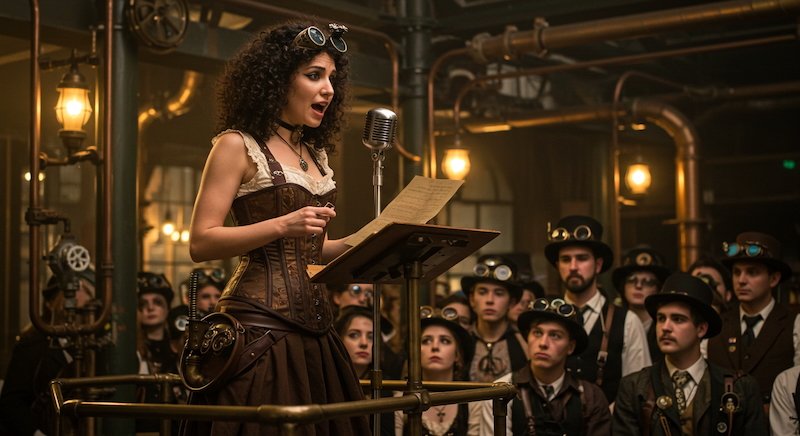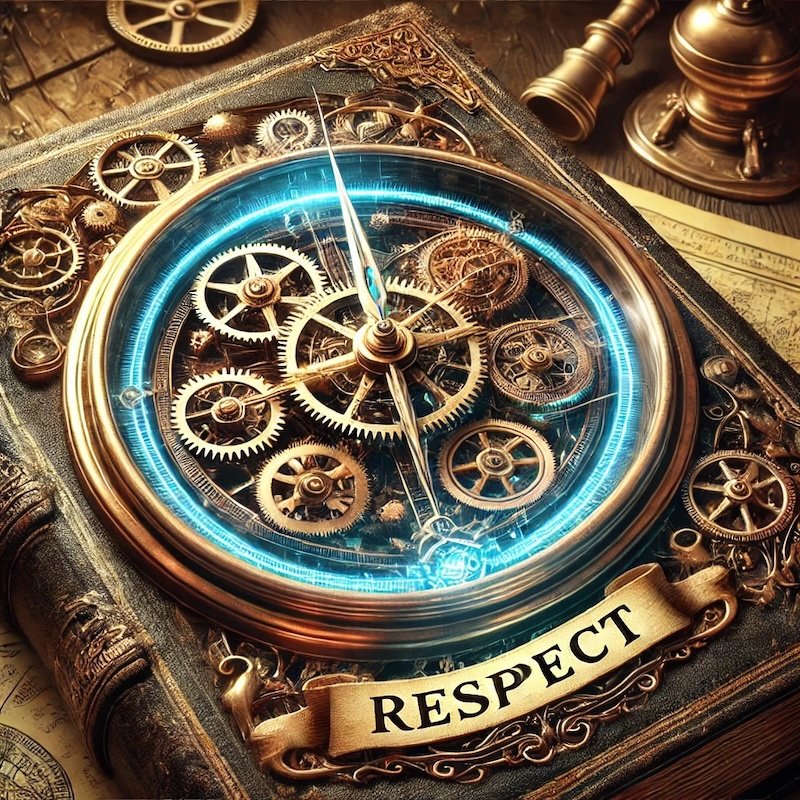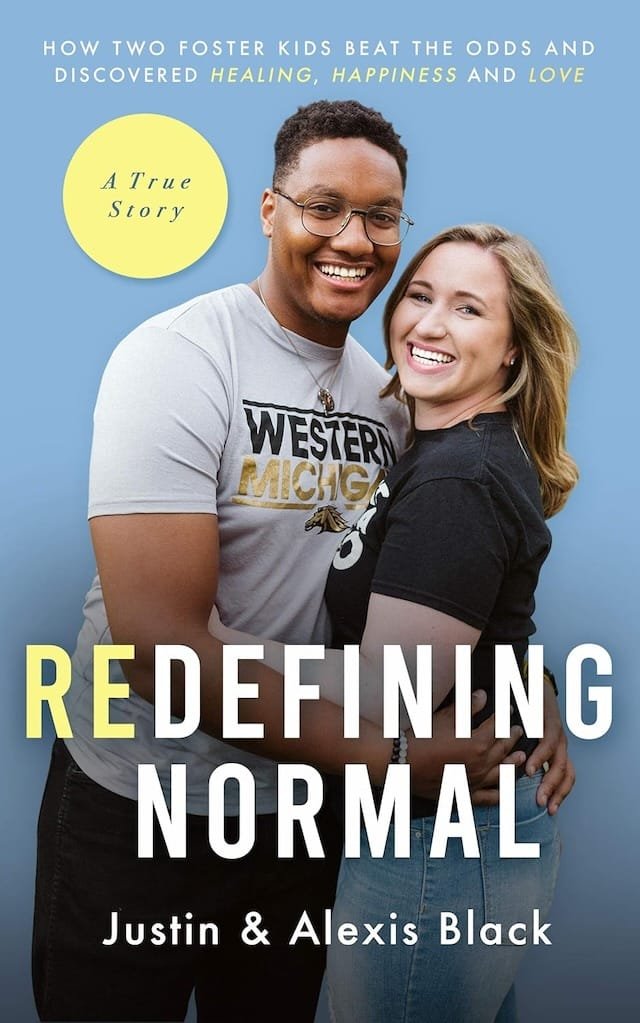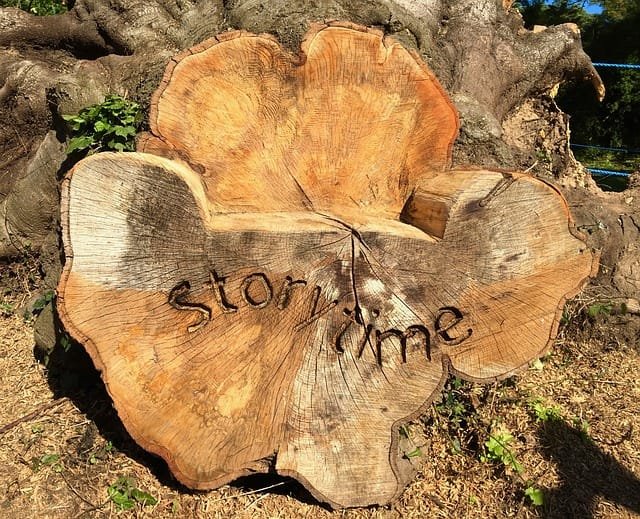Embracing Narrative Transportation
We’ve all had the experience of being pulled into a story — fiction or nonfiction — to the point where the rest of the world seems to fade away. Reading books and watching movies are common examples, but this phenomenon also occurs when we’re watching a play, listening to a podcast or watching a public speaker delivering a talk stage. In each case, we’ll experience the storyteller’s story. This doesn’t happen every time, of course, as a story must capture our attention to such an extent that the narrative’s world becomes our world. And although it’s often associated with fictional stories, it applies equally to personal stories.

So what do we mean by narrative?
Well, if you ask a dozen people and you’ll most likely get a dozen answers to that question, but here’s my take. In personal storytelling, a narrative builds a world in which you (and other characters) interact with life through the properties of space, time, and events. Beyond the characters, settings, and experiences, this narrative also touches on thoughts, emotions, insights, and reflections.
An impactful personal story, which is what I’m all about, seeks to present each narrative element, each story block, in a way that transforms a simple memory into a compelling and authentic story that conveys deeper truths about our life, values, beliefs, insights, and lessons learned.
When well-crafted, personal stories inform, inspire, connect, and engage others. But as I’ve mentioned, not all personal stories are equally effective in this regard. In the balance of this post, we’ll take a look at how we can create more impactful stories by understanding and using the principles of narrative transportation.
This is a subject that has been studied extensively during the past twenty years. Cognitive scientists & social psychologists, as well as literary & communication scholars, have all weighted in on this and a handful of related topics which I’ve included below to provide a fuller picture of what it all means.
Narrative Transportation is the psychological experience of being so fully immersed in a story that you temporarily feel transported into its world, losing awareness of your physical surroundings and experiencing the events alongside the characters. This powerful storytelling effect occurs when a narrative captures your imagination so completely that you emotionally respond to the story as if it were happening to you, often leading to stronger message retention, attitude changes, and even behavioral shifts after the story ends. When stories achieve narrative transportation, audiences don’t just understand the plot—they live it, making this phenomenon one of the most valuable tools in a storyteller’s arsenal.
Immersion in storytelling is the powerful sensation of being mentally and emotionally transported into a fictional world, where readers or viewers temporarily forget their surroundings and become deeply engaged with the characters and events unfolding before them. When a story successfully creates immersion, the audience experiences the narrative as if they were living through it themselves, with all their senses activated and their attention fully captured by the plot, setting, and characters. This state of being completely absorbed in a story world is what allows people to laugh, cry, or feel fear while experiencing fiction, making immersion one of the most sought-after qualities in effective storytelling across books, films, games, and other media.
Absorption in storytelling refers to the state where readers or viewers become so deeply engaged with a narrative that they lose awareness of their surroundings, experiencing a mental transportation into the story world. Effective storytelling creates this absorption by combining compelling characters, rich sensory details, emotional resonance, and well-paced action that captures attention so completely that time seems to pass unnoticed, leaving the audience fully immersed in the fictional experience rather than merely observing it from the outside.
Engagement in storytelling refers to the ability of a narrative to capture and hold a reader’s or audience’s attention, creating an emotional and intellectual connection that makes them invested in the story’s outcome. Effective engagement occurs when audiences become so immersed in the characters, plot, and world that they temporarily set aside their awareness of reality, experiencing genuine emotional responses—whether tension, joy, sadness, or surprise—and feeling compelled to continue following the story to its conclusion. This connection is achieved through relatable characters, meaningful conflicts, authentic dialogue, and pacing that balances revelation with anticipation, all working together to create an experience that resonates with the audience long after the story ends.
Involvement in storytelling refers to the ability of a narrative to emotionally engage and immerse its audience, creating a connection that makes readers or viewers feel invested in the characters and outcome. An effective story draws people in through relatable characters, compelling conflicts, and authentic emotional stakes that resonate with universal human experiences. When a story achieves strong involvement, the audience temporarily forgets they’re experiencing fiction—instead, they empathize with the characters’ struggles, celebrate their victories, and feel genuine concern for their wellbeing. This deep level of engagement is what separates forgettable tales from stories that linger in our minds and hearts long after they’ve ended.

I have captured a number of phrases from the above descriptions that illustrate the effect engrossing stories have on an audience. As you’ll see, while there’s an intellectual aspect to the process, the emphasis is largely on the emotional response that well-crafted stories invoke in an audience.
- emotional resonance
- emotionally engaging
- psychological experience
- transported into its world
- fully immersed in the story
- stronger message retention
- achieves strong involvement
- time seems to pass unnoticed
- completely absorbed in a story world
- mentally and emotionally transported
- invested in the characters and outcome
- empathizes with the characters’ struggles
- losing awareness of physical surroundings
- experiencing genuine emotional responses
- resonates with universal human experiences
- senses activated, and attention fully captured
- deeply engaged with the characters and events
- experiencing the events alongside the characters
- creating an emotional and intellectual connection
- experiencing a mental transportation into the story
How do these expressions align with your experiences? I think the concept of transportation is most appropriate, as there’s movement, a shift that occurs in our perception of reality. We care about what happens; we get excited and sad, we laugh and cry, we feel tension and relief.
But are these shifts temporary, or is there a longer term effect? Does the effect linger, or is the spell broken once the story ends? That depends on a number of factors, such as how relatable and relevant the story is, but the simple answer is that personal stories based on our experiences, as opposed to fictional stories built for entertainment, resonate more deeply, leaving a lasting impression.
During narrative transportation, our mental energies — encompassing attention, emotions, and imagery — become primarily focused on events unfolding within the story, and in turn, we will become cognitively, emotionally, and imaginatively absorbed in the narrative. By fostering connections with characters and evoking relevant emotions, personal stories can effectively influence how audiences feel about certain subjects or individuals.
What Factors Support Narrative Transportation?
I’m often asked what makes a personal story compelling, and the components of narrative transportation reveal a number of topics to consider. You’ll find some overlap in the list below, as the terms do relate to each other in important ways, but they’re worth considering individually, and they all play a role in telling your personal story.
- fluency — refers to the smooth, effortless way a story flows, naturally transitioning between scenes and ideas, allowing readers or listeners to become fully immersed in the narrative world and lose awareness of their physical surroundings.
- similarity — refers to the connection an audience feels between themselves and story elements, such as characters, experiences, backgrounds, cultures, beliefs, and values, making a story more relatable and engaging.
- relevance — refers to how well a narrative connects with the audience’s existing experiences, values, or concerns, mirroring their own lives in important ways, making the story feel personally meaningful and relatable.
- coherence — refers to the logical and meaningful connection between all elements of a narrative — characters, events, settings, and themes — with events unfolding in ways that make sense within the theme of the narrative.
- familiarity — refers to the degree to which elements of a story, such as settings, characters, situations, or emotional truths, resonate with a reader’s existing knowledge, experiences, or expectations.
- immersion — refers to the feeling of being mentally and emotionally absorbed into a story’s world, engaging our attention, imagination, and emotions to the point where the real world temporarily fades into the background.
- logical flow — refers to the invisible thread that connects each scene to the next, each character decision to its consequences, without any inconsistencies that may force an audience to question why events are unfolding as they are.
- anticipation — refers to the delightful tension or suspense created when an audience is made aware that something significant is about to happen, causing them to become emotionally invested in what comes next.
- believability — refers to the quality that makes a narrative feel true, authentic, and coherent within its own internal logic, while not including any obvious errors or inconsistencies within the story.
- engagement — refers to the emotional and mental connection created when an audience is fully immersed in a story and often results in increased empathy and a lasting impact on thoughts, attitudes, or behaviors.
- identification — refers to the process by which an audience emotionally connects with a character or perspective within a story, allowing them to see themselves in the character’s experiences, values, or struggles.
- sensory details — refers to the vivid descriptions of sights, sounds, smells, tastes, and textures that help create a rich and engaging atmosphere, thus immersing an audience in the narrative.
- mental imagery — refers to the process of mentally “seeing” the scenes, “hearing” the dialogue, or “feeling” the emotions described in a narrative, as if they were happening in real life.
- narrative quality — refers to how well a story compasses elements like compelling characters, a coherent plot, vivid descriptions, and emotional resonance that draw people in and hold their attention.
- engaging dialogue — refers to the artful construction of conversations within a story that reveals characters’ personalities, motivations, and relationships while maintaining authenticity and purpose.
- mental simulation — refers to the cognitive process whereby individuals simulate a story’s events, actions, and emotions in order to feel they’re part of the story, thus enhancing understanding and emotional connection.
- psychological realism — refers to authentically portraying the inner thoughts, emotions, and motivations of characters, which can foster empathy and engagement and influence beliefs, attitudes, and behaviors.
- emotional connection — refers to the bond or resonance a person feels when hearing a story that evokes feelings such as empathy, joy, sadness, or excitement, making the story’s messages or lessons more memorable and impactful.
- character development — refers to the process of creating and evolving characters in a story, revealing a character’s traits, motivations, and backstory over the arc of the narrative.
- cultural appropriateness — refers to the alignment of a story’s themes, characters, language, and values with the cultural norms, beliefs, and experiences of its intended audience, making it more relatable.
A very consistent finding over a number of studies, across a number of different topics, by a number of different researchers is that transportation leads to greater attitude and belief change. So when people become immersed in these stories, they’re more likely to take the messages of the stories and apply it outward to the real world.
~ Dr. Melanie Green
Why Is Narrative Transportation Relevant?
Dr. Green’s quote explains it rather well, especially the ending. The point of an impactful personal story is to share your experiences, lessons learned, insights, or ideas in a way that fosters understanding, allowing others to take elements of your story and weave them into their story — apply it outward to the real world. The extent to which this happens is related to the extent to which they connect to you and your narrative. Narrative Transportation is how that happens, which is why reviewing the text above can help improve your story’s impact.
This improvement not happens during the writing / editing process, but during your rehearsals. Ideally, you’re able to rehearse your story in front of a trusted friend or family member. That’s when you can solicit feedback. Ask them what feelings arose while hearing your story, or what they were thinking. And if your narrative included descriptive prose, what did the “see”, what mental imagery came to mind?
What Factors Prevent Narrative Transportation?
It’s important to think about how the various aspects of narrative transportation can improve your story, but it’s also vital to consider what might reduce impact. Those factors that limit the positive effects. Here are a few things to consider.
- Lack of coherence or clarity — anything in the story that doesn’t make sense?
- Lack of realism — does your story depart from reality, or seem false at times?
- Errors or inconsistencies — are there any notable mistakes in your narrative?
- Confusing narrative structure — are there any disruptions to the story’s flow?
- Audience alignment — does your story contradict the audience’s experiences?
- Sense of being manipulated — do you come off as having a hidden agenda?
Such situations tend to pull people out of your narrative as they question what you’re saying or why you’re saying it. And as before, this is where feedback from the rehearsal process can identify if any of these issues are present. Ask them if there were times when something you said didn’t make sense, or seemed false in any way. Did it feel as though a certain element could be expanded upon for clarity, or if an important element was missing altogether?
Is There a Downside to Narrative Transportation?
Unfortunately, yes. When engrossed in the narrative world, individuals are less likely to critically evaluate the information presented, making them more open to accepting the story’s perspective. That’s a positive outcome for true stories, but when stories are based on lies — con artists, unscrupulous politicians, and dishonest business leaders, for example — people may be persuaded to adopt beliefs and ideologies that are harmful to themselves, and possibly society as a whole.
History — as well as present times — are full of examples where individuals, organizations, and governments intentionally lie in order to manipulate the thoughts, feels, and actions of the public. We’ll cover that aspect in a future article.
Conclusion
Since our desire is to maximize the impact when sharing our personal stories, reviewing your manuscript from the standpoint of narrative transportation is one way to make that happen!
◆
contact me to discuss your storytelling goals!
◆
Subscribe to our newsletter for the latest updates!
Copyright Storytelling with Impact® – All rights reserved








